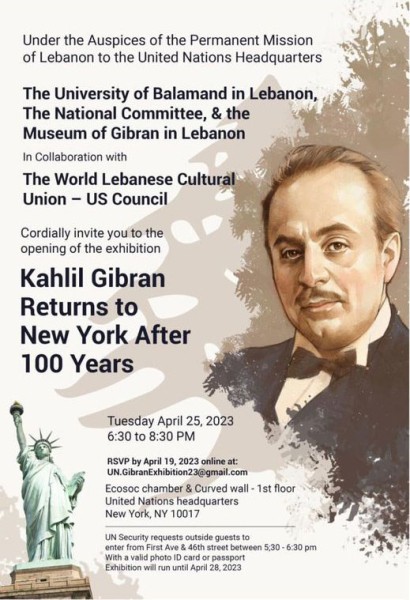Kahlil Gibran Museum Lebanese poet and artist Kahlil Gibran was celebrated at the United Nations on the 100th anniversary of his most famous work, The Prophet, coinciding with the 75th anniversary of the Universal Declaration of Human Rights.
Both share an emphasis on the rights and freedoms of all people.

Kahlil Gibran Museum The exhibit Kahlil Gibran Returns to New York After 100 Years was on display at UN Headquarters in April 2023 to celebrate the Lebanese poet and artist.
“The Universal Declaration stated that we are all born equal, and this is exactly what Gibran wrote,” observed Shirin Yaseen, an associate spokesperson for the UN Secretary-General.
The Universal Declaration opens with the provision that “All human beings are born free and equal in dignity and rights. They are endowed with reason and conscience and should act towards one another in a spirit of brotherhood.”
“Gibran emphasizes that we should all treat each other as brothers,” Ms. Yassen pointed out.
The Lebanese poet, whose works have been translated into more than 100 languages, vividly expressed the spirit of equality in the first person, writing: “I love you when you bow in your mosque, kneel in your temple, pray in your church. For you and I are sons of one religion, and it is the spirit.”
UN Headquarters in New York drew artists, diplomats, and members of the local community to a celebration marking the centenary. In April, an exhibit, Kahlil Gibran Returns to New York After 100 years, showcased paintings, notebooks, manuscripts, and the first edition of The Prophet.
“We are at the United Nations because Kahlil Gibran believed in peace, in human rights, in diversity and the dialogue between civilizations,” explained Joseph Geagea, Director of the Gibran Museum in Lebanon. “He believed that as human beings, there are no differences among us; we should walk on the same level to reach the same point: a better future for all.”
Ms. Yassen said family, women, love, and nature were all very important aspects of the poet’s work.
“It left an impression for successive generations,” she said. “Gibran spoke about people without any discrimination based on their race or religion or colour, and these are things that are embodied in the Universal Declaration of Human Rights. That is the importance of this person’s work and how much it means at the United Nations.”

